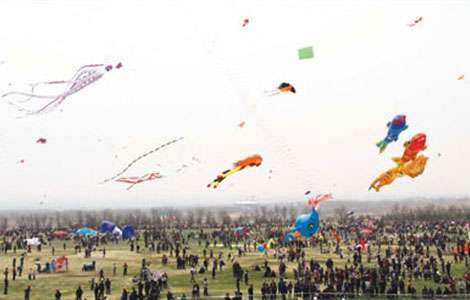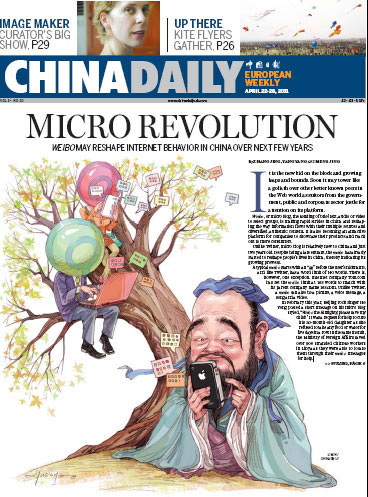Putting China on the global map
Updated: 2011-04-29 10:47
By Chris O'Brien (China Daily European Weekly)
Intelligentsia must present complex academic subject matter in an accessible, engaging way
A three-day gathering for academics in Beijing back in July 2009 might well be remembered as the moment when China rebranded a global export that has in recent times failed to match the profitability of most of its products: ideas.
The inaugural Global Think Tank Summit pulled together more than 100 institutes from China and overseas and marked the entrance on the world intellectual scene of the China Centre for International Economic Exchanges (CCIEE).
The timing of the establishment of the CCIEE - during the tumultuous aftermath of the global financial crisis - was an explicit challenge to the hegemony of Western economic and political principles. Its cast of high-profile Chinese economists, social scientists and retired officials is strong but is it capable of crafting a script compelling enough to thrust the Chinese view into international thinking?
Importance of independent thinking
The foremost priority of Chinese think tanks and research institutes must always be to produce quality research that informs and asks searching questions of policymakers.
Think tanks have long been important landmarks on the political landscape in the West, educating and criticizing governments, and agitating for policy change, all in the public sphere. In China the think tank has traditionally assumed the role of an intellectual government agency; a direct conduit of ideas to senior officials.
But the prospects for a more rounded public role for think tanks in China are highly encouraging. A cursory glance at the international news headlines on one day in late April featured three calls for Chinese policy adjustments from leading think tanks; ranging from a challenge to the central bank to rely more on interest rates to tame inflation and a warning that the agriculture sector will face increasing pressures from rising costs this year.
When evaluating the true level of independence enjoyed by Chinese think tanks it must be said - and indeed it is not said enough - that several think tanks in the West are hardly beacons of objectivity, with many in the UK displaying political motivations. And the Oscar-winning documentary Inside Job, which investigated the causes of the 2008 financial crisis, exposed the links of some of the US's most influential academics to the financial services industry.
Effective communication of Chinese research - not just by Chinese think tanks but by the country's top universities - to the rest of the world will be crucial. Research institutes and universities in the West are wise to the value of being able to present complex academic subject matter in an accessible, engaging way.
Chinese institutions will have to develop these skills and then devise ways to ensure ideas can cross borders in the form of informative and stimulating research stories. Think tank and university websites will have to be revamped to present these stories to a global audience and encouraged to make their academics more visible, particularly to the media.
When I worked as a journalist in Beijing I saw -and indeed was partly responsible for - the narrowness of the Chinese academic sources that were consulted by the international media. With only a handful of academics going out of their way to connect with journalists, the same lines of thinking, however insightful, are being parroted in the world's most influential newspapers. Of course it is a two-way process. It is far easier for time-pressured journalists to interview familiar contacts than cultivate new ones.
Proactive communication will help export ideas overseas but China will also have to rely on international media to give its academics a powerful forum. The day will surely arrive when a Chinese think tank is commenting regularly on a major international conflict overseas -just as think tanks like the International Institute for Strategic Studies opine on the current crisis in Libya-but this transition will take time.
For China has a glut of ideas to communicate. A recent report by the UK's Royal Society envisaged that the number of scientific research papers published by academics at Chinese universities would surpass those from the US within two years. Chinese universities have launched a recruitment drive for overseas academics, which includes encouraging Chinese-born researchers to return to their homeland.
The sternest test will be to promote the Chinese voice on the international stage. China may find this is best achieved by formulating shared ideas with other developing economies. In April last year the BRIC Think Tank Summit in Brasilia marked the intentions of Brazil, Russia, India and China to form a united front for developing policies on climate change, clean energy and forestry protection.
As international collaboration continues to increase, this influx of academic talent into China is bound to have a further positive effect on the exchange of ideas between the East and West.
Through my own work with the likes of Nottingham University Business School, the China Policy Institute and the Globalisation and Economic Policy Centre, I have seen the richness of research that stems from interdisciplinary collaboration between academics on Nottingham's UK campus and its full-scale branch campus in Ningbo, China.
The foundations, then, for the development of China's think tanks and research institutes are sound. As the world explores new policy measures to prevent another global financial crisis, Chinese academics have a real opportunity to make their voices heard.
The author is a communications consultant with UK-based Bulletin Academic, which specializes in communicating academic research to the international media, policymakers and industry.
E-paper

Blowing in the wind
High-Flyers from around the world recently traveled to home of the kite for a very special event.
Preview of the coming issue
Image maker
Changing fortunes
Specials

British Royal Wedding
Britain's Prince William and his girlfriend Kate Middleton get married on April 29.

Costly dream
Uninhabited havens up for lease but potential customers face wave of challenges in developing them.

Models gear up car sales
Beauty helps steer buyers as market accelerates.
